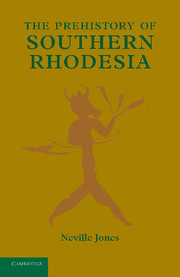Book contents
- Frontmatter
- Contents
- ILLUSTRATIONS
- Preface
- Note
- Chapter I Historical
- Chapter II The Earliest Men
- Chapter III The Building-up of the Rhodesian Sequence
- Chapter IV The Caves and Rock-shelters
- Chapter V The Rock Paintings
- Chapter VI The Ironstone Kopjes
- Conclusion
- Glossary
- References
- Index
- Miscellaneous Endmatter
- Frontmatter
- Contents
- ILLUSTRATIONS
- Preface
- Note
- Chapter I Historical
- Chapter II The Earliest Men
- Chapter III The Building-up of the Rhodesian Sequence
- Chapter IV The Caves and Rock-shelters
- Chapter V The Rock Paintings
- Chapter VI The Ironstone Kopjes
- Conclusion
- Glossary
- References
- Index
- Miscellaneous Endmatter
Summary
The foregoing account of what has been done in investigating the prehistoric archaeology of Southern Rhodesia is but a small part of the story that will some day be told. It may well be that future research will call in question many of the statements made and conclusions arrived at, but it is hoped that a foundation has been well and truly laid on which the work of the future can be built. No problem has been finally solved and every apparent solution has raised a host of other problems with which the prehistorians of the future will need to concern themselves.
There can hardly be any doubt that, when the continent of Africa has been thoroughly investigated, we shall possess a comprehensive and consecutive picture of the development of the human race from the earliest days. To this end the work that has been, and is still being, done in various centres of investigation will make a substantial contribution. The results that have already been achieved combine to illustrate the astonishing richness of the African continent in prehistoric material, and give promise of great discoveries awaiting future investigators. One matter to which it is to be hoped the future will provide an answer relates to the period covered by human occupation. How long has man lived in Africa? What periods of time are indicated by the different cultural phases recognised? These questions are invariably asked by all who have had their interest stimulated, and they are at the present time incapable of being adequately answered. The fact of their being uppermost in people's minds alone prevents their dismissal as of little importance. While the absence of definite information in no way prevents the prehistorian from getting on with his work, he must seek ultimately to find satisfying answers. Much valuable work has recently been done in Europe in this direction by Dr F. E. Zeuner who, in his recently published book(62), sets forth the results he has arrived at by painstaking investigation. He considers that man has existed in west and central Europe for 590,000 years, which he estimates to be the age of the rostrocarinate tools of the Ipswich area. From that time to the end of the great hand-axe culture is given as in the region of 400,000 years and the Upper Palaeolithic cultures emerged between 100,000 and 70,000 years ago.
- Type
- Chapter
- Information
- The Prehistory of Southern Rhodesia , pp. 73Publisher: Cambridge University PressPrint publication year: 2013



